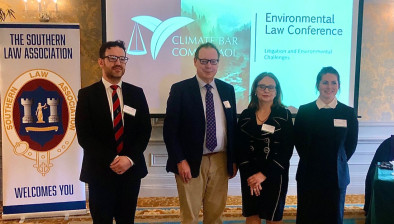High Court: Bord na Móna must disclose environmental information despite being held by subsidiary

The High Court has determined that certain environmental information relating to biomass imports by a Bord na Móna subsidiary must be disclosed despite being held by the subsidiary company.

About this case:
- Citation:[2023] IEHC 57
- Judgment:
- Court:High Court
- Judge:Ms Justice Niamh Hyland
Bord na Móna (BNM) claimed that the subsidiary was not a public authority and was therefore exempt from the requirements under the European Communities (Access to Information on the Environment) Regulations 2007 - 2018.
Delivering judgment in the case, Ms Justice Niamh Hyland determined that the subsidiary company held commercial information on behalf of BNM as well as its own commercial purposes, which brought the information within the scope of the AIE Regulations and Directive 2003/4. Accordingly, there was no reason why the information should not be provided to the requesting party.
Background
In April 2019, Right to Know CLG made a request to BNM for certain information relating to all biomass imports from January 2017 to present. The information included inter alia country of origin, amount in tonnage, names of growers and companies from which BNM purchased biomass. Correspondence with the Minister for Climate Action and certain agendas/minutes of meetings with the Department of Communications, Climate Action and the Environment.
BNM refused access to the information on the basis that the information was held by a subsidiary company called Biomass. It asserted that Biomass was not a public authority and accordingly the provisions of the AIE Regulations did not apply. BNM also claimed that it did not have to provide the information because it was subject to commercial confidentiality.
The matter was referred by Right to Know to the Commissioner for Environmental Information. In a decision from September 2021, it was determined that Biomass was holding environmental information on behalf of a BNM, which was a public authority. As such, it was held that BNM had to provide the information to Right to Know.
BNM appealed the decision to the High Court pursuant to Order 84C RSC on numerous grounds. It was argued that the Commissioner’s decision was not consistent with the proper interpretation of the AIE Regulations. Further, it was said the Commissioner failed to have regard to matter such as, inter alia, that Biomass was a separate legal entity and a self-funding business and that Biomass did not exercise delegated functions on behalf of BNM.
Additionally, it was claimed that “environmental information held for a public authority” did not include information created by a subsidiary for its own commercial purposes. It was also said that the degree of connection between Biomass and BNM was not directly relevant to whether information was held for BNM and it was possible for Biomass to refuse consent disclosure to BNM.
The Commissioner submitted that he had adhered to the wording of the definitions under Directive 2003/4 and to the interpretive test adopted in NAMA v Commissioner for Environmental Information [2015] 4 IR 626. It was noted that the Commissioner had considered the Turf Act 1998 as part of his determination that there was a close connection between BNM and Biomass.
High Court
Ms Justice Hyland began by considering the legislative context in which Biomass and BNM operated. Under the Turf Development Acts, BNM formed subsidiary companies and the objects of these companies would be the principal activities of BNM. Enactments which applied to BNM would also apply to subsidiaries. BNM could also direct subsidiaries to perform certain functions.
It was clear that BNM exercised “enormous control over the subsidiary”, having regard to the company structure and matters such as the Memorandum of Association, the issuing of share capital to the BNM and the appointment of a chairperson by BNM to Biomass. There was significant integration between BNM and Biomass, the court held.
Turning to the issues in the appeal, the court held that the Commissioner was correct to consider the relationship between the companies when making his decision, and would only have erred if the decision was grounded entirely on the relationship between the companies. The Commissioner expressly accepted the separate legal personality of the companies and that BNM did not “hold” the information sought.
The court accepted that if BNM had no control over the information, then it could not be considered as held “for” BNM. However, the court also held that BNM had a legally enforceable right to obtain the information from Biomass, where Biomass had to comply with directions from BNM under section 37(5) of the Turf Act 1998. The court held that this extended to providing the information if it was requested by BNM.
In dealing with the exemptions which was canvassed by BNM, the court noted that if BNM was relying on its own commercial interests to exclude disclosure, then this was “striking”. However, if BNM was relying on Biomass’ commercial interests to exclude disclosure, then this suggested a close relationship as determined by the Commissioner.
The correspondence and internal reports from BNM also outlined a commonality between BNM and Biomass, using references such as “us” and “our”, which the court determined to be significant.
The core decision by the Commissioner was that a subsidiary could hold information for a public authority and on its own account. Considering the objectives of Directive 2003/4, the could held that disclosure of information should be the general rule.
In interpreting what “on behalf of” meant under the Directive, the court held that it was appropriate to ascribe a wider interpretation of the term to include the present situation. In other words, the fact that an entity held information for itself did not preclude the possibility that the information was also held for someone else.
On this basis, the Commissioner did not err in his conclusions that the information was held by Biomass for BNM. Given the commercial context of BNM and Biomass, the information was being held on behalf of BNM.
Conclusion
The decision of the Commissioner was upheld and BNM was required to disclose the information to Right to Know.
Bord na Móna plc v. The Commissioner for Environmental Information [2023] IEHC 57











